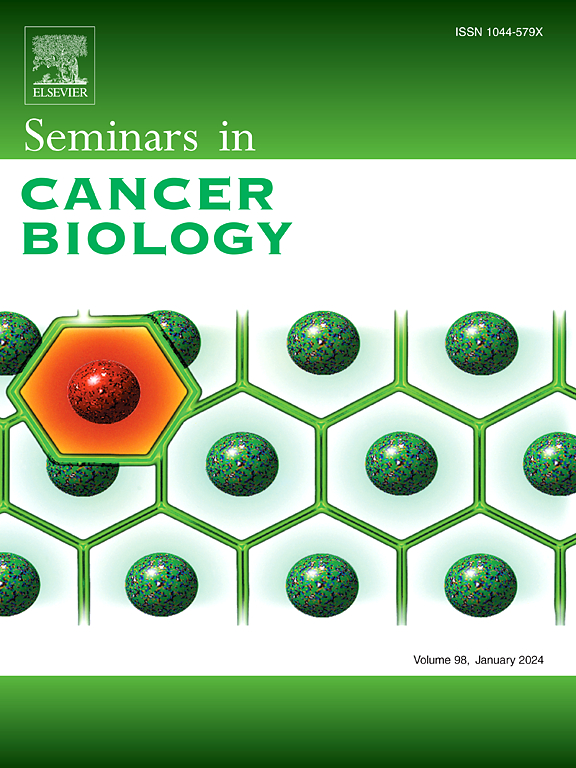The potential application of stroma modulation in targeting tumor cells: Focus on pancreatic cancer and breast cancer models
IF 12.1
1区 医学
Q1 ONCOLOGY
引用次数: 0
Abstract
The tumor microenvironment (TME) plays a crucial role in cancer development and spreading being considered as “the dark side of the tumor”. Within this term tumor cells, immune components, supporting cells, extracellular matrix and a myriad of bioactive molecules that synergistically promote tumor development and therapeutic resistance, are included. Recent findings revealed the profound impacts of TME on cancer development, serving as physical support, critical mediator and biodynamic matrix in cancer evolution, immune modulation, and treatment outcomes. TME targeting strategies built on vasculature, immune checkpoints, and immuno-cell therapies, have paved the way for revolutionary clinical interventions. On this basis, the relevance of pre-clinical and clinical investigations has rapidly become fundamental for implementing novel therapeutical strategies breaking cell-cell and cell -mediators’ interactions between TME components and tumor cells. This review summarizes the key players in the breast and pancreatic TME, elucidating the intricate interactions among cancer cells and their essential role for cancer progression and therapeutic resistance. Different tumors such breast and pancreatic cancer have both different and similar stroma features, that might affect therapeutic strategies. Therefore, this review aims to comprehensively evaluate recent findings for refining breast and pancreatic cancer therapies and improve patient prognoses by exploiting the TME’s complexity in the next future.
基质调节在肿瘤细胞靶向中的潜在应用:聚焦于胰腺癌和乳腺癌模型。
肿瘤微环境(tumor microenvironment, TME)在肿瘤的发展和扩散中起着至关重要的作用,被认为是“肿瘤的阴暗面”。在这个术语中,包括肿瘤细胞、免疫成分、支持细胞、细胞外基质和无数协同促进肿瘤发展和治疗耐药性的生物活性分子。最近的研究结果揭示了TME对癌症发展的深远影响,在癌症进化、免疫调节和治疗结果中发挥着物理支持、关键介质和生物动力基质的作用。建立在脉管系统、免疫检查点和免疫细胞疗法基础上的TME靶向策略为革命性的临床干预铺平了道路。在此基础上,临床前和临床研究的相关性已迅速成为实施打破TME成分与肿瘤细胞之间细胞-细胞和细胞-介质相互作用的新治疗策略的基础。本文综述了乳腺和胰腺TME的主要参与者,阐明了癌细胞之间复杂的相互作用及其在癌症进展和治疗耐药中的重要作用。不同的肿瘤,如乳腺癌和胰腺癌具有不同或相似的基质特征,这可能会影响治疗策略。因此,本综述旨在全面评价在未来利用TME的复杂性改进乳腺癌和胰腺癌治疗和改善患者预后方面的最新发现。
本文章由计算机程序翻译,如有差异,请以英文原文为准。
求助全文
约1分钟内获得全文
求助全文
来源期刊

Seminars in cancer biology
医学-肿瘤学
CiteScore
26.80
自引率
4.10%
发文量
347
审稿时长
15.1 weeks
期刊介绍:
Seminars in Cancer Biology (YSCBI) is a specialized review journal that focuses on the field of molecular oncology. Its primary objective is to keep scientists up-to-date with the latest developments in this field.
The journal adopts a thematic approach, dedicating each issue to an important topic of interest to cancer biologists. These topics cover a range of research areas, including the underlying genetic and molecular causes of cellular transformation and cancer, as well as the molecular basis of potential therapies.
To ensure the highest quality and expertise, every issue is supervised by a guest editor or editors who are internationally recognized experts in the respective field. Each issue features approximately eight to twelve authoritative invited reviews that cover various aspects of the chosen subject area.
The ultimate goal of each issue of YSCBI is to offer a cohesive, easily comprehensible, and engaging overview of the selected topic. The journal strives to provide scientists with a coordinated and lively examination of the latest developments in the field of molecular oncology.
 求助内容:
求助内容: 应助结果提醒方式:
应助结果提醒方式:


